On the first of December, 1685, a band of bedraggled refugees landed at Appledore in Devon, and made their way to nearby Barnstaple. They were both sea sick and hungry after a difficult eleven day crossing from the West coast of France. Among them was my 6 x great grandfather, Louis Mauzy, a Huguenot minister, along with his wife Suzanna and at least two children. All the refugees on board the ship were Huguenots, fleeing a new wave of French persecution against their Protestant-based religion. Although they had no friends or contacts in this area of Devon, they were welcomed with open arms by the inhabitants of Barnstaple, who rushed to find them bread to eat, gave all of them lodging and hospitality in their homes, and then helped them find their way into new lives here.

This dramatic story might never have been recorded, but for the diligence of fellow-refugee Jacques Fontaine, who had helped to organise the escape. Many years later in 1722, as Jacques reached the final stages of his life, he decided to write up his life story for the sake of his children and descendants. He made two copies by hand, to try and ensure that it would never be destroyed, and you’ll find the touching way in which he addressed his descendants at the end of this blog. It’s a rarity to find such an extended and accessible memoir from this period.
I have a particular interest in life stories, and have coached many courses and individuals to encourage memoir-writing, along with writing the book Your Life, Your Story. What we don’t write down may soon be lost, so it’s a huge gift to posterity to tell a life story, in full or in part. Thanks to Jacques’ resolution to preserve his story, we have a remarkable first-hand account of the flight of this group of French Huguenots from their homeland to begin new lives in England, and later in Ireland, both in Fontaine’s case, and in that of my own Mauzy ancestors. Jacques’ full-length memoir is entitled Persécutés pour leur foi: Mémoires d’une famille huguenote (Persecuted for their Faith: Memoirs of a Huguenot Family), and written in a very direct and engaging way. (The subsequent translation is a different matter, as I’ll explain later.) Extracts are included here, to bring to life his riveting account of this extraordinary journey. You can read the full set of extracts that I’ve translated via a link to a PDF at the conclusion of this blog.

Huguenot Ancestors
I knew that we had one prominent French Huguenot line in our family tree on my father’s side, which is that of the Despards, who arrived much earlier, at the court of Queen Elizbeth I in the late 16th century, and settled in Ireland as engineers and miners. I plan to write a blog about them in the not-too-distant future, celebrating my illustrious Despard cousin ancestor, the famous Col. Edward Marcus Despard (1751-1803), who fought alongside Nelson, was hanged as a radical, (or as a traitor, depending on your point of view) and who features, in a fictionalised version, in the television series of ‘Poldark’!
But as for the Mauzy family, I knew nothing, except that my 6x gt grandfather Louis Mauzy had been born in France and somehow ended up in Devon. His granddaughter Elizabeth, like my 7 x gt grandmother Alice Despard earlier, later married into the Irish line of my family. Living in Devon myself, I was curious to learn more about the story of how they arrived on these shores.
And I owe it to Jacques Fontaine’s enthusiasm for detail, that the name of my grandfather is actually recorded in his account of the escape from France. I’d probably never have found it though without an internet search for the uncommon name of Mauzy, which led me to the French edition of the memoir, available as a printed book. If I’d simply looked at the English translation, I wouldn’t have found it, as it only refers to a ‘Huguenot Minister’. This English version was produced in 1838 by one of Fontaine’s descendants, and omits many other chunks of text; it also changes the tone, endeavouring to make it consistently solemn and pious throughout, instead of the mix of entertaining digressive rambles and changes of mood which Fontaine himself employed, in an engaging way. If by any chance you’re eager to delve into this life story, I suggest you try the French text if you possibly can, as it has a wealth of detail and genealogy excluded from the later translation.

The Huguenots flee from France
Who were the Huguenots? They were principally French Protestants who emerged in the wake of the 16th century Reformation, and followed in particular the doctrines of the religious reformer Jean Calvin. (The origin of the name Huguenot is uncertain, but is probably taken from Dutch or German allusions.) They came under attack from Catholics in France, and many were killed in ambushes and by raiding parties, especially in the infamous St Bartholemew’s Massacre of 1572, the time when the Despards in my family tree fled to England and Ireland. For a while, peace between the two religious factions was restored by a treaty known as the Edict of Nantes, issued in 1598. But this stability eventually broke down, and under King Louis IV, persecution of the Huguenots began again. When King Louis XIV ascended the French throne in 1643, it escalated to the point where he directed troops to seize Huguenot homes and force them to convert to Catholicism. Then in 1685 Louis XIV enacted the Edict of Fontainebleau, otherwise known as the Revocation of the Edict of Nantes, which made Protestantism illegal. More bloodshed ensued, and over the next several years, over 200,000 Huguenots fled France for other countries. You can read the full account here, and another produced by the UK Huguenot Society here.

It now becomes clear why this particular party of Huguenots fled to Devon in 1685. But this order of 1685 also forbade Huguenots to leave France, so anyone who wanted to make a run for it had to do so with great secrecy, as Fontaine’s story reveals. Patrols were out, looking for would-be deserters. Anyone caught trying to escape would be punished: the men condemned to row on galley ships, and the women imprisoned or sent to convents. ‘Convert or be enslaved’ was the message. The Huguenot Society tells us : About 200,000 Huguenots left France, settling in non-Catholic Europe – the Netherlands, Germany, especially Prussia, Switzerland, Scandinavia, and even as far as Russia where Huguenot craftsmen could find customers at the court of the Czars. Many of the Huguenots were well-educated and highly skilled in trades such as weaving, engineering, goldsmithing and clock-making, so their exodus deprived the country of a whole class of professionals and artisans.
But one thing puzzled me: in Fontaine’s account he says that while he and the others had to hide while waiting to board their ship, terrified of being caught, Louis Mauzy and his family were already on board, with a passport to leave. Then I discovered that Protestant Ministers were in fact ordered to ‘expatriate’ at this point in time. So to keep his faith, and to keep his family safe, Mauzy was compelled to leave his homeland.

And then, reading further, I learned that, as it happened, this turned out to be his sole chance to escape. The English translation of Fontaine’s memoirs gives a note that: ‘In 1686, The enactments were still more severe. A Protestant taken in the act of public worship was punished with death, and all Protestant clergymen whether natives or foreigners were to be executed. To increase the vigilance of the soldiery, a reward of three or four pistoles [gold coins] was given for every Protestant that was taken up.‘ (A Tale of the Huguenots, Jacques de La Fontaine, translated 1838, p100). So as it turned out, Louis Mauzy had only a few short months to make good his escape to England, during the brief period when he had been ordered to leave. If he had tarried, he and his family would most probably have been killed. Louis Mauzy brought with him his wife Suzanne, née Sannager, and at least two children, a girl also called Suzanne, and my future 5 x gt grandfather who was probably christened Louis, but known later as Lewis, in the anglicised form.
An article on ‘England’s First Refugees’ notes that ‘comparatively few refugees came in 1685, the actual year of the Revocation of the Edict of Nantes, or in 1686’, so it was only the brave or desperate few who took their chances at this period. I will now let Jacques Fontaine’s story take over.

Mémoires d’une famille huguenote
Chapter IX p. 127
In November 1685, Jacques Fontaine realised that it was the moment to try and escape from France with his own family, which included a sister-in-law and a niece. ‘I offered others the chance to come, but the response was that it wouldn’t only be foolish, but simply crazy, to risk such great dangers, since the coasts were all well-guarded, both on land and at sea.’
They arrived at a place called La Tremblade, not far from La Rochelle on the west coast ‘We stayed with a drunkard who was to be the pilot for the English vessel and who spoke English, and because of whom we ran a thousand risks of being discovered due to his carelessness and inebriation.’ After waiting for a few days, they were told that they could leave the next day, and ‘the drunkard’ ordered them to wait for him on the beach at Mus-de-Long. Here he intended to pick them up his boat. ‘We left at night, with a couple of horses to carry our small amount of luggage. Once on the beach, I made a speech to those there, and said a prayer for our situation…a prayer which was definitely uttered from the heart as much as from the mouth.´ They weren’t alone: ‘We were among some 40 or 50 people on the shore, nearly all of them young men and women.’ Things did not go as planned: ‘Some of them didn’t take all the precautions necessary to conceal their escape, with the result that the papists [Catholics] were forewarned, and sent orders that the ship should not depart; therefore, we remained in the dunes the whole day.’
There was a further scare, as the parish priest from La Tremblade had decided to take a stroll in those dunes, with his dog and a companion. ‘They were almost upon us; we had placed ourselves between two little hills of sand, and we could see the dog… But, by divine providence, two poor fishermen, who had already seen us [and were sympathetic to our plight] …made them believe that they were off track. They assured them that if they continued in this direction, they would get lost in the hills of the sand dunes.’ The fishermen thus successfully diverted the priest and his friend onto another path.
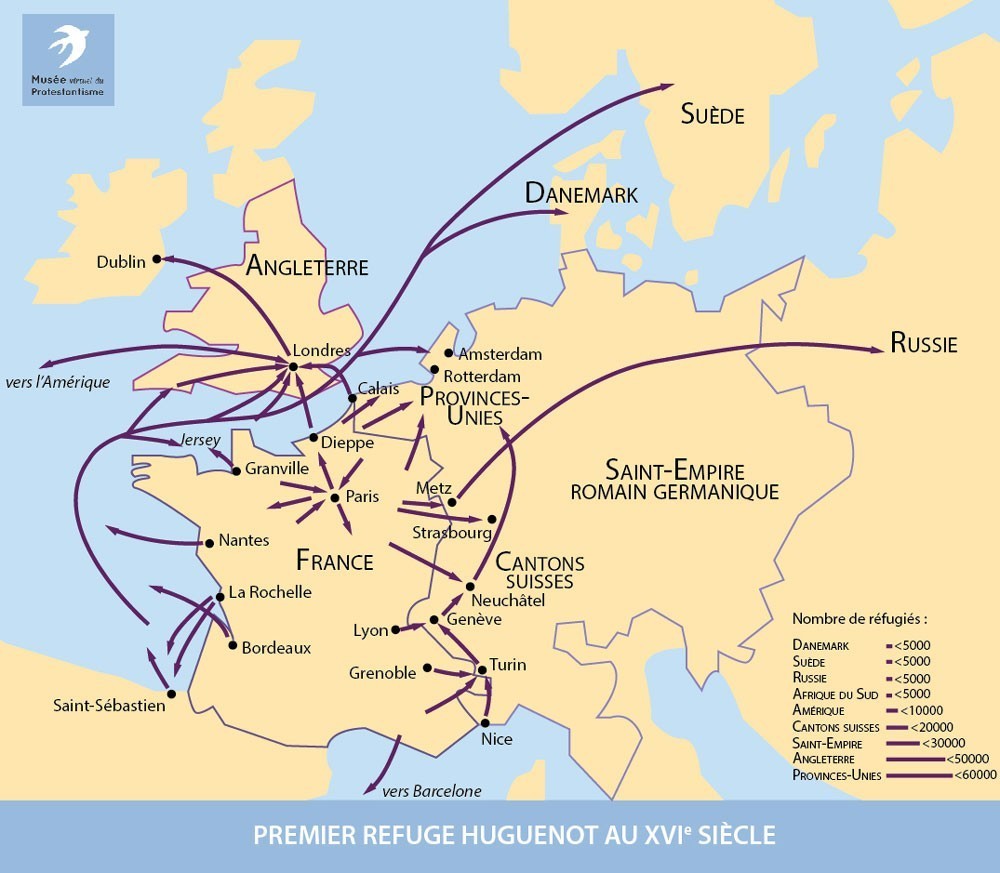
Since the first attempt at boarding the ship had failed, Fontaine and his family party returned to La Tremblade:
We lodged at the home of a local townsman, where fifteen or twenty of us spent the day hiding in his house. He took us in very reluctantly, as they’d been searching all the houses in order to discover where we were. He was in a terrible state of fear…, because he would have to pay a fine of a thousand ecus if he were caught harbouring a Protestant. Night having come, he finally decided not to run such a risk, and ordered us all to leave his house; this was a little uncivil, but his reasoning was understandable.
“I have,” he said, “damned my soul in order to save my wealth, and I would lose it to save yours! No,” he said, “either do as I do or take your chance elsewhere.”
We considered this treatment to be rather cruel, but we had good cause to thank God later, since less than half an hour after we had left, the authorities came with some soldiers, and visited the house of our host, where they didn’t find anyone hiding. We hid ourselves again as best we could, one here, another there, among the poor sailors’ wives who we found far more charitable than the rich people, and thus we spent the next four or five days.
The area around La Rochelle itself was at this period largely Protestant, which also helped their chances of escape. But their troubles weren’t yet over. The captain of the English ship eventually arrived, but told the group they would have to follow him in their little boats to a place on the coast where he could pick them up unobserved once he’d cleared customs and finished with the official paperwork.
‘In the dusk of the same evening, on the 29th November 1685, we went on board a little open launch – my fiancée, her sister, my niece and me, two lads from Bordeaux and six young girls from Marennes, and, under the cover of night, we passed the guard boats on the Seudre and got through the current of Oleron without being spotted. Then at ten o’clock in the morning, we got soaked near the Ile d’Aix, at the tip of the Ile d’Oleron. There we waited until our ship appeared. We’d given an order to our boatman that if we were pursued, he should beach his boat as fast as he could, and then it would be simply a question of “Run for dear life!”‘
However, Jacques Fontaine had been lame ever since childhood, when a doctor failed to diagnose his broken leg. Running away was something he couldn’t do: ‘As for myself, who couldn’t count on my legs to carry me off, I had my gun and a pair of pistols, and was resolved never to sell my life and be taken alive.’ All went well though to start with, and they had already exchanged the agreed signals with the English captain, when suddenly: ‘We saw a royal frigate, which was used solely for checking ships, to make sure that no Protestant left the kingdom; if they found any, they sent the men to the galley ships and the women to convents.’ Their own boat lying at anchor would most definitely attract suspicion. ‘And we were only a canon ball’s length away from them!’ The escapees were in a state of utter terror.
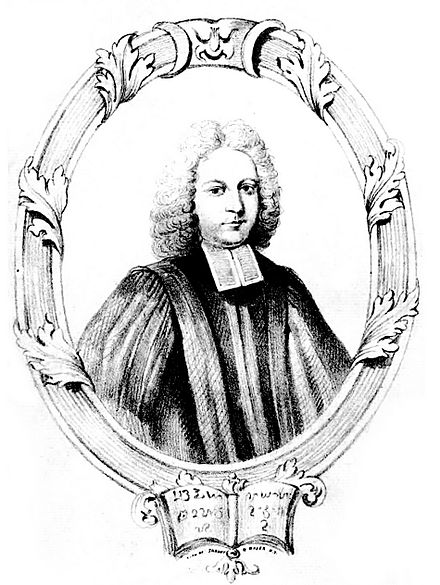
The officers did indeed search the main ship, and this is where Fontaine refers to my own great grandfather, Louis Mauzy, mentioning that he had already boarded: ‘They searched everywhere in the ship. But no one was hiding on board; only M. Mauzy, a minister, and his family were there, with their passport. What a blessing, Lord, that we hadn’t already managed to get to the ship! If they had been delayed until an hour later, they would have found all of us.’ They still could not board however, but had to try and keep up with the ship to a place where it would be safe to embark, while at the same time not giving the officers any cause for suspicion. ‘When they had finished, they ordered the English captain to set sail, which he did, and he left with a favourable wind, leaving us behind, and with the frigate positioned nearly between us and him. This was a terrible crisis, because if we returned to La Tremblade, it was a hundred to one that we would not be able to escape.’ The little boat they were waiting in would arouse suspicion if it was still there: ‘The poor boatman, who only had his son as crew, wailed and lamented his plight and that of his son, persuaded that only the hangman’s noose awaited the two of them, since he had already changed his religion.’ This was a real crisis.
Finally, Jacques came up with a ploy to explain convincingly why they were anchored in this spot. The Huguenots would hide at the bottom of the boat, covered by an old sail, while the boatman blamed his presence on unfavourable winds. Fontaine, rather proud of his ploy afterwards, told the boatman what to do while the officials made their inevitable inspection: ‘If those on the frigate asked him where he was going, he would say:”From La Rochelle, and I want to go to La Tremblade.” If they asked, “And what have you got on board?” “Only ballast.”‘ The boatman must also pretend that he and his son were drunk and incompetent, presumably to heighten the impression of poor judgement!
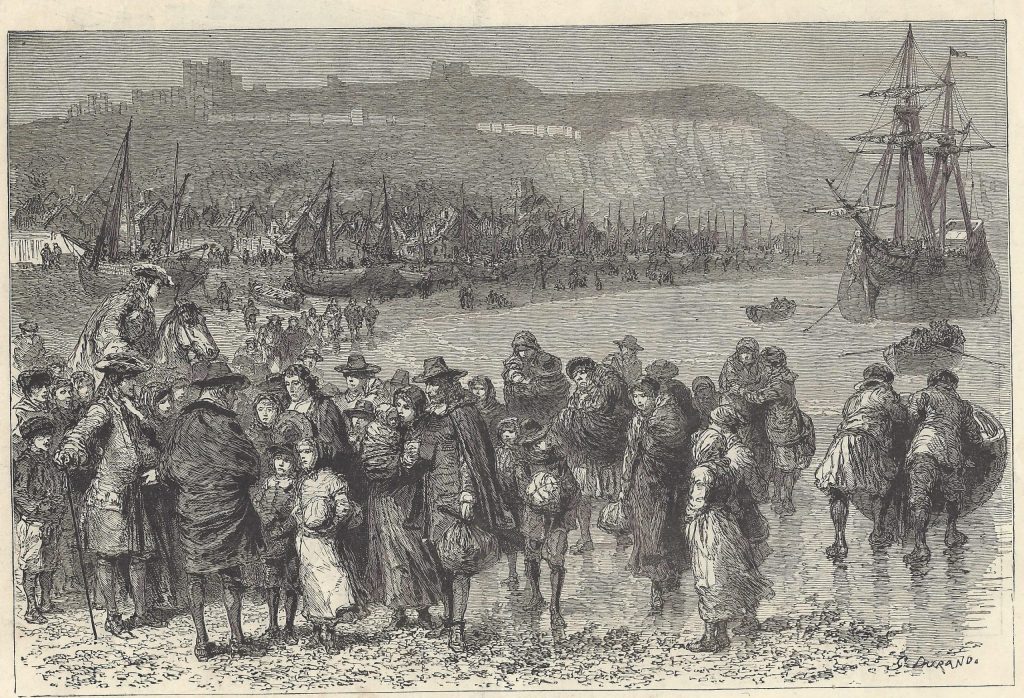
It worked! They were then able to board the ship piloted by the English captain, and endured an eleven day crossing, with strong head winds and little to eat and drink. ‘At last we disembarked on the 1st December (old style calendar) at Appledore, in the Bristol Channel, at the mouth of the little river, which flows to Barnstaple. Having paid for our passage, your mother and I only had twenty gold pistoles [gold coins] left between us; but God, who had not led us to a safe country only to let us die from hunger, touched the hearts of the chief citizens of Barnstaple, who having sent for us, all twelve took one or two of us into their homes and treated us with incredible gentleness and friendliness, each taking as much care of the French person they had in their house as if we had been their children or their brothers, meaning that God allowed us to find fathers, mothers, brothers and sisters amongst strangers.‘
That first bite of fresh bread, given by welcoming strangers, made a huge impression on Jacques and his fellow refugees: ‘I am also compelled to remember, with gratitude for Divine Providence, that first mouthful of bread which I ate, having disembarked in Appledore. Our joy at being safe, and the privations we suffered in the ship, added to the usual purgations from being at sea, with myself in particular being the one most afflicted by sea sickness, led us now to having a great appetite, with the result that the most urgent thing (after giving thanks to God) was to ask for some bread.’

But it only took a minute or two before Fontaine, who was an astute trader, as well as preparing to for Protestant ordination, saw a perfect business opportunity:
‘They gave us ‘biscuits’ [baked roundels of bread], as big as plates, which in France would be worth around two sous apiece; and, when we came to pay, they asked us to pay only half a sou for each ‘biscuit’. I was impressed with their good price, but because the man we were talking to spoke only very poor French, I thought he had made a mistake; after asking him several time he always said that each biscuit cost half a sou. Unable to believe this, I gave a little girl a marked sou, and told her to go and buy me bread with this amount. She went to the baker and brought me back two of these biscuits or galettes. That confirmed the price to me.’
The bread, and thus the wheat grain it was made with, were very cheap. He began to hatch a plan: ‘At first it occurred to me that anyone who could send grain to France would make a considerable profit; but my fiancée and I only had twenty pistoles left.‘ He lost no time in checking out the grain market in Bideford the next day, accompanied by an interpreter, and then in borrowing money from other refugee friends already based in Plymouth., and thus he started making his first deals on English soil. One of his projects soon afterwards was to import fancy French items and sell them through his own shop in Exeter – brandy, tobacco and fine wine being among the goods.



Images of Appledore, taken on our visit there in 2018. Many of the houses and quaint cottages in the town date from the period of the Mauzy family’s arrival in 1685. The Customs House would surely have been an important place!
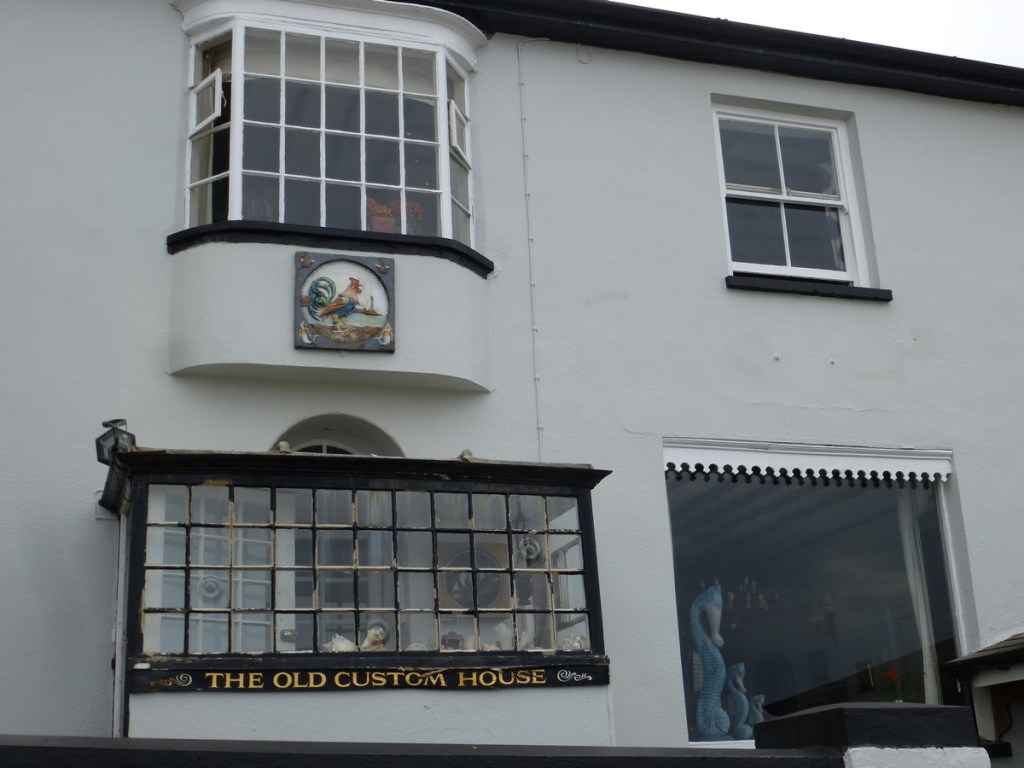
Fontaine’s story continues in the memoir, as he moved with his family to Taunton, where he ran various import and export schemes, some more successful than others. Eventually, they settled in Ireland where a kaleidoscope of adventures continued, including inhabiting a ‘haunted’ house in Dublin and dealing with pirates off the coast of Cork. Jacques died in 1728, aged 70, having written his life story, and prefaced it with this touching dedication:
My dear children,
Having observed the deep interest you have taken in all that has befallen your ancestors, when I have related their adventures to you, I am induced to write down their history for your use, to the end that the pious examples of those from whom we derive our origin may not be lost to you, or those who succeed you.
Translation: With grateful thanks to Gill Yates, who helped me to translate these extracts, and more of the text, from the French. You can read the full text of our translations as a PDF file using the link below.

The Mauzy family
But what of the Mauzy family? After this tantalising, eye-witness glimpse of my ancestors on the boat, it’s back to the records, which are scanty. However, the basic outline of their lives is that Louis Mauzy became the pastor of the Huguenot congregation in Barnstaple in North Devon. His daughter Suzanne married André Majendie, and they settled in Exeter where André became a minister for the Huguenot Congregation, possibly at the ‘French Church’ of St Olave’s, or more likely at the second French congregation which existed in the city, its meeting place unknown. Suzanne died as a widow, in Dartmouth on the south Devon coast, leaving her ‘garden’ to her daughter Charlotte, and her ‘silver candlesticks’ to her son John James, along with other bequests. She was buried at St Petrox , an ancient church which stands on the rocky peninsula at the end of the estuary, looking out at the sea which featured so dramatically in Suzanne’s life; she had been one of the refugee party, on board in 1685.
Louis’ son Lewis Mauzy (my 5 x gt grandfather) became a doctor of medicine, married Anne Hutchinson in about 1705, and lived in Exeter; he also left a will when he died in 1727, which establishes some of the family connections. True to his Protestant ethics, the will opens with the mournful instructions: It is my desire to be buryed in the most private manner my body to be laid in a plain black coffin without any Binding and carried to the Grave by six honest and ordinary Men without any other Bearers or Mourning. We do not know as yet where he was buried.
Lewis and Anne had at least five children, one of whom, Elizabeth, married into an Irish Protestant family (with names Long and then subsequently Phillips) and became my 4 x gt grandmother. Among the children of Lewis and Anne is a son, also called Lewis, who graduated from the University of Oxford, where he is recorded in the alumni lists.
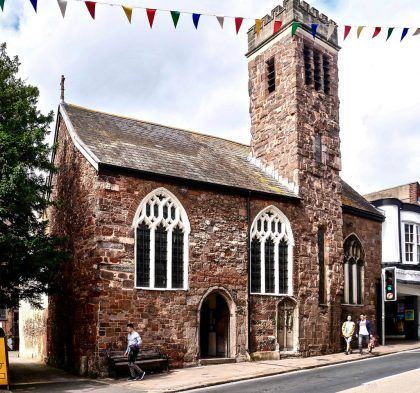
I never expected to find a Devon connection in the Irish side of my family history, or to have a first-hand account of how these ancestors escaped from France. They were refugees, and they were welcomed into Devon, which has given me pause for thought in these times when we have our own refugee crises. In one sense, they paved the way, and indeed, the word refugee is said to have come from these Huguenots who fled in fear of their lives. They certainly enriched the life of those countries which which took them in, as they brought their considerable talents and skills with them.
My task here has been to tell just one family story, backed up by reliable sources, but without the expertise of specialist researchers, who devote themselve to the task of Huguenot history. As soon as I can, I plan to go back to Appledore and Barnstaple and look at these places with new eyes, knowing now that this is where the Mauzy family and their fellow refugees landed and began their new lives.
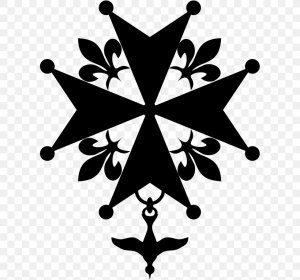
Further reading:
Papers
‘The Huguenots of Devon’ – Alison Grand & Robin Gwynn, Devonshire Association Transactions, Dec 1985 (117: 161-194)
‘The Huguenots in Exeter’ – Col. Ransom Pickard, Devonshire Association Transactions, June 1936
‘The Mauzey-Mauzy Family’ – Armand Jean Mauzey, The Virginia Magazine of History and Biography, Jan 1950 (pp 112-119) sourced in JStor
Internet articles
Devon Huguenots – John Lerwill
Huguenots and Walloons in Devon


Other stories from my family history
A Coventry Quest: Finding a Grandfather

So particularly enjoyed reading this and love the illustrations too. Absolutely fascinating: each blog is a joy – keep thinking “This one can’t be bettered” – until the next one appears!
LikeLiked by 1 person